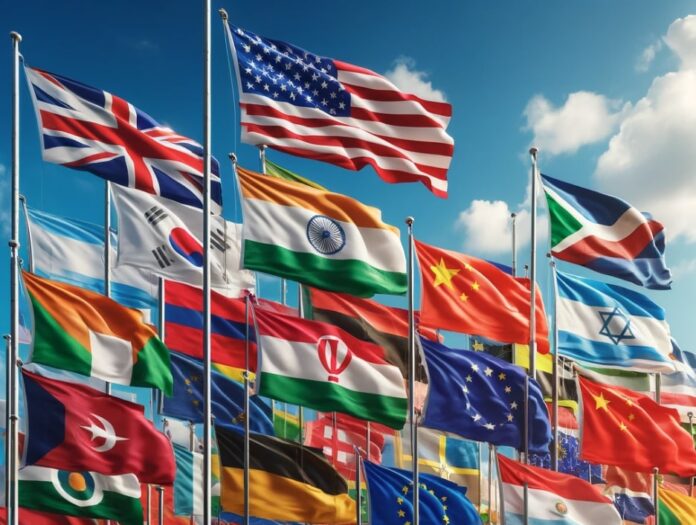As 2024 unfolds, the political landscape is witnessing significant shifts and developments. From international diplomacy to domestic policies, political actions and decisions are influencing the course of history. This article delves into the most impactful political events and trends of 2024, providing insights into their implications for the global community.
The US Presidential Race Heats Up
The United States is gearing up for one of the most consequential presidential elections in recent history. With incumbent President Joe Biden seeking re-election, the political arena is witnessing intense debates and campaign strategies from both the ruling party and the opposition. Key issues include healthcare reform, climate change policies, and economic recovery post-pandemic. The outcome of this election will undoubtedly shape the global political climate.
The UK Economy and Elections
The United Kingdom is facing a crucial period with upcoming elections that will determine its economic and political direction. Key issues include Brexit’s long-term impact, economic recovery strategies post-pandemic, and social welfare policies. The political climate is charged, with debates on healthcare, immigration, and trade policies taking centre stage.
The European Union’s Strategic Realignments
The European Union (EU) is undergoing strategic realignments to address economic challenges, security concerns, and the push for greater integration among member states. The EU’s Green Deal continues to be a focal point, aiming to make Europe the first climate-neutral continent by 2050. Additionally, the ongoing discussions on digital sovereignty and data protection are crucial as the EU navigates its relationship with tech giants and international partners.
Tensions in the Asia-Pacific Region
Geopolitical tensions in the Asia-Pacific region are on the rise, with key players like China, Japan, and India taking centre stage. The South China Sea disputes and Taiwan’s quest for greater international recognition are major points of contention. Meanwhile, ASEAN countries are working towards strengthening regional cooperation to ensure stability and economic growth amidst these tensions.
China’s Global Influence
China continues to expand its global influence through economic investments and strategic partnerships. The Belt and Road Initiative remains a key component of China’s foreign policy, aiming to enhance global trade routes and infrastructure. Domestically, China is focusing on technological advancements and economic stability. Internationally, its relations with the US and neighbouring countries are crucial for regional and global stability.
The Korean Peninsula
The Korean Peninsula remains a focal point of geopolitical tension. North Korea’s continued missile tests and nuclear ambitions are a significant concern for regional security. South Korea is working closely with international allies, including the US, to address these threats while promoting peace and stability on the peninsula. Diplomatic efforts continue, but the situation remains precarious.
Japan’s Political and Economic Strategy
Japan is navigating its economic and political strategy with a focus on technological innovation and regional security. The country is strengthening its defence capabilities in response to regional threats, while also pushing forward with economic policies aimed at revitalising growth. Japan’s diplomatic efforts with neighbouring countries, particularly in the context of North Korean missile tests, are pivotal.
The Middle East’s Path to Stability
The Middle East continues to be a region of critical geopolitical importance, with countries like Iran, Saudi Arabia, and Israel playing pivotal roles. Recent peace talks and diplomatic efforts are aimed at resolving longstanding conflicts and fostering economic cooperation. However, the region remains volatile, with issues such as the Iran nuclear deal and the Syrian crisis demanding international attention and intervention.
Ongoing Conflict Between Israel and Palestine in Gaza
The conflict between Israel and Palestine continues to escalate, with recent clashes in Gaza drawing international concern. Efforts for peace are being mediated by global powers, but the situation remains tense. Humanitarian issues and security concerns are at the forefront, and the international community is closely monitoring developments in hopes of a resolution.
The Ukraine and Russia Conflict
The conflict between Ukraine and Russia persists as one of the most significant geopolitical crises. Despite numerous sanctions and diplomatic efforts, hostilities continue. The situation has significant implications for global security and energy markets, with NATO and European Union countries playing key roles in seeking a peaceful resolution.
India’s Pivotal Elections
India, the world’s largest democracy, is gearing up for a pivotal election that could reshape its political landscape. Key issues include economic reforms, national security, and social policies. The outcome of this election will not only impact India but also have broader implications for regional stability and global markets.
Africa’s Emerging Political Landscape
Africa is experiencing a wave of political changes, with several countries holding elections that could redefine their political future. Nations like Nigeria, South Africa, and Kenya are witnessing significant political movements advocating for transparency, anti-corruption measures, and economic reforms. The African Union’s efforts to promote continental unity and development are also noteworthy, as they strive to position Africa as a key player on the global stage.
Latin America’s Struggle for Democracy
Latin America is facing a critical juncture in its political evolution. Countries like Brazil, Venezuela, and Argentina are grappling with issues of governance, economic instability, and social unrest. The region’s struggle for democratic resilience is marked by mass protests, electoral reforms, and international diplomatic efforts to support democratic institutions.
Australia and New Zealand’s Political Landscape
Australia and New Zealand are also witnessing significant political activities. Australia’s government is focusing on climate change policies, indigenous rights, and economic reforms. Meanwhile, New Zealand’s political scene is abuzz with discussions on housing affordability, healthcare, and environmental sustainability. Both countries are navigating their roles in the Asia-Pacific region amidst growing geopolitical tensions.
The political landscape of 2024 is dynamic and multifaceted, with each region facing its unique set of challenges and opportunities. Understanding these developments is crucial for grasping the broader implications on global stability, economic growth, and international relations. As these events unfold, staying informed and engaged with the political discourse will be essential for citizens and policymakers alike.




